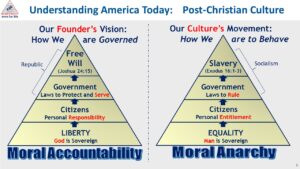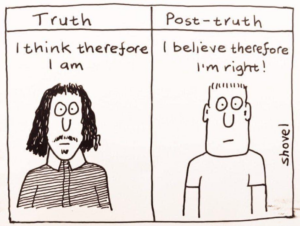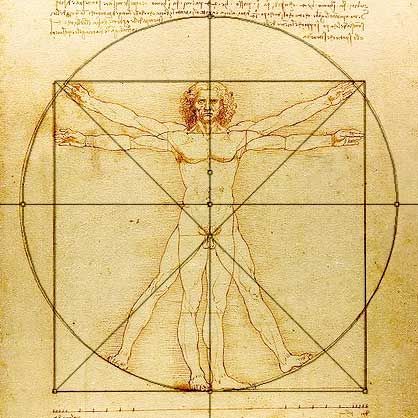
What is Secular Humanism?
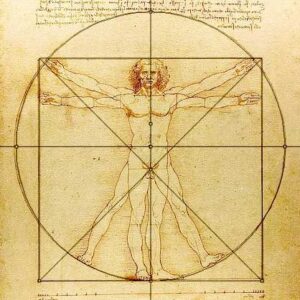
Point of fact: secular humanism is a religion in its own right.
Surprised?
I was, too, when I stumbled across an article mentioning how the United States Supreme Court had declared it as such in the 1961 case of Torcaso v. Watkins (367 U.S. 488).
“Man is the measure of himself” as expressed visually in Da Vinci’s Vitruvian Man is their creed and motto (see the entire Star Trek franchise for a vivid portrayal of this philosophy in action within in a fantasy world having no basis in reality).
So what are the tenets of this religion?
Secular humanism is defined as human beings and human reason reigning supreme. Because it would be patently insane to swear allegiance to such a concept when viewed in light of the Scriptures’ assertion of mankind’s inherently evil nature, the polar opposite of this biblical truth is also posited: man is inherently good.
In a vain attempt to then explain the existence of evil in the world, the corollary to this faulty assumption is an individual’s evil behavior must be caused by external forces beyond that individual’s ability to control, such as:
- Division of any society into groups based on criteria such as:
- Skin color
- Ethnicity
- Gender
- Age
- Sexual orientation
- Degree of personal wealth and/or financial opportunity — or lack thereof
- Any other overtly distinguishing trait/factor.
- Oppression by a “ruling class” towards one or more of these groups resulting in:
- A lack of upward socioeconomic mobility
- The lack of a “voice” in local, regional, and national politics
- A lack of education
- Religious fanaticism
- Perceived deprivation of any other kind
These factors are rarely presented individually, but most often in combination. Please note the only factor missing from this list is personal responsibility for one’s own actions. (more on that below) The general rule is this: the more oppressed groups a person belongs to, the less blameworthy that person is for his/her misbehavior. To give an example of this from modern-day political discourse, a wealthy, educated, heterosexual, white male is completely to blame whereas an impoverished, illiterate, black or Hispanic lesbian gets a total pass for the selfsame act.
Having abysmally misdiagnosed the “disease,” secular humanism goes on to prescribe totally ineffective “cures,” further espousing the ultimate solution to all human problems is to be found in education, technology, and social engineering (such as wealth redistribution) over time, with a total dependency upon the mechanism of secular human government to bring those solutions into existence.
As I have already covered in a previous article, the Law of Unintended Consequences dooms all such solutions to utter and ignoble failure — even disaster! — not to mention that all governments founded upon such a pathetically flawed philosophical concept inevitably and inexorably lead to totalitarianism.
The most recent example is the tragedy-in-progress occurring in Venezuela — a country which only a decade or so ago was the 4th-largest economy in the world and the most prosperous nation on the South American continent — which has been reduced through socialism into a place where rich oligarchs are living in mansions, the common-people are now fighting over garbage for something to eat, their worthless currency litters the gutters of their streets, and the national police are running down protestors with their armored cars as I write this.
Point of fact: this is precisely the kind of situation socialism was ostensibly created to relieve. Oops!
God vs. Secular Humanists
Whenever you begin discussing accountability for personal behavior, the immediate counter-argument from any rebel is going to be: “Well, why should I allow thus-and-so to be boss over me?” I know this question well because I used to be a rebel and that was my perpetual response. Because I had been bullied and abused by authority figures (not my parents) throughout my childhood and adolescence, I had a hearty distrust — even contempt — for authority figures in general, an attitude which did not serve me well, especially as a believer. But I digress…
As you trace any chain of authority upwards, peeling back layer after layer of human beings and/or human-ordained-and-operated entities, it ultimately and irresistibly terminates at the very throne of the Most High God because there is no higher authority to be found.
If there is indeed a loving, omnibenevolent, omnipotent, omniscient, and transcendent One True God — and indeed there is! — then we are accountable for our personal behaviors before Someone who will pass judgment on both what we did and how we did it while here on this earth, both good and bad. He is the sole Authority Who defines right and wrong, good and evil as absolute values with no gray areas, no equivocation, no compromise.
Since we human beings collectively know deep inside ourselves we are total screw-ups, such a realization immediately stirs up guilt, shame, and fear, all emotions we intensely abhor and from which we compulsively flee. This reaction has been endemic to the human condition since The Rebellion in Eden.
Essentially, secular humanism amounts to a bunch of rebellious children in total denial of reality, collectively performing the spiritual equivalent of sticking their fingers in their ears and shouting, “La, la, la, la!”
Therefore, it is any true humanist’s all-consuming mission to remove God from every aspect of their lives as well as the lives of others they desire to influence. This singular compulsion is the root of atheism, deism, Darwin’s Theory of Evolution, Communism, Nazism, Freudian psychology, existentialism, postmodernism, and every other crackpot pseudo-scientific or political concept ever devised, all of which attempt to remove God from their equations and supplant Him with flawed human reason.
Since secular humanism idolizes the human intellect, those who embrace secular humanism are by definitions idolators. The OT repeatedly describes such an attitude as,”They did whatever was right in their own eyes.” Even the most cursory examination of the Scriptures clearly demonstrates how God is off-the-charts displeased with idolatry as well as those who practice it.
So despite some folks’ profession of Christianity, if they have embraced the worldview of secular humanism, they are either :
- At worst, not even Christ-followers in the first place, or;
- At best, totally backslidden and out of fellowship with the Most High.
Which of these applies to any given individual is way above our pay grade to judge, but any way you cut it, their lives are going to look a lot more like:
Now the works of the flesh are evident, which are: adultery, fornication, uncleanness, lewdness, idolatry, sorcery, hatred, contentions, jealousies, outbursts of wrath, selfish ambitions, dissensions, heresies, envy, murders, drunkenness, revelries, and the like; of which I tell you beforehand, just as I also told you in time past, that those who practice such things will not inherit the kingdom of God.
Galatians 5:19-21
And very little like:
But the fruit of the Spirit is love, joy, peace, longsuffering, kindness, goodness, faithfulness, gentleness, self-control. Against such there is no law. And those who are Christ’s have crucified the flesh with its passions and desires.
Galatians 5:22-24
Postmodernism
This is the latest expression of secular humanism. I’m sure you’ve heard the term “postmodern” applied to our current society and culture, but surprisingly there is much debate concerning what truly defines the term. Rather than wade through that morass of arguments, I will simply list the 4 most significant tenets of postmodernist philosophy along with a brief explanation of each comparing it to early 20th-century modernism:
Power controls knowledge.
According to postmodernists, all knowledge is political. That is to say, what people believe is shaped largely by their relationship to the political powers governing the institutions (such as schools and churches) through which knowledge is transmitted. Whereas modernists want to free the pursuit and transmission of knowledge from political control (say, through democratic reforms), postmodernists want to gain political power for communities (e.g., religions, races, or cultures) whose views have been “suppressed” or “underrepresented.” As postmodernists see it, since knowledge can never be free from political control, the solution is for each community to seek whatever power it can to preserve and extend its own voice.
Objectivity is dead.
Postmodernists argue the goal of a perspective-free, objective view of reality must be abandoned. Modernists recognize that people have different perspectives, or ways of looking at the same things, but seek to overcome those differences through reason. They typically think that humans can achieve a neutral, impartial, objective, and total view of reality through the rigorous application of logic and the scientific method.
Postmodernists regard such a goal as neither realistic nor desirable. In their view, neutrality is unattainable: it is impossible, even in science, to approach any subject matter without preconceived notions, presuppositions, and viewpoint. Postmodernists argue that the goal of a perspective-free, objective view of reality must be abandoned.
Science constructs models; it does not describe reality.
The goal of science as understood in modernism is a comprehensive knowledge of the world as it really is. In contrast, Thomas Kuhn’s 1962 landmark book The Structure of Scientific Revolutions itself led a revolution in science. According to Kuhn, science constructs models or paradigms — idealized representations of the way things are in the world — and these paradigms approach but never correspond to or arrive at an objective truth. Rather, they are replaced from time to time as the need arises, typically from the introduction of new information that the old paradigm cannot easily support.
Kuhn has convinced a generation that science cannot and need not seek truth; its goal is rather an understanding of nature that meets the needs of the scientific community and of the larger society. Such a view of science, of course, implies that scientific theories are now to be assessed partly in terms of how well they support the values of those who pursue science.
Tolerance, not truth, is absolute.
Modernists value tolerance, partly in the belief that by tolerating all points of view, we have a better chance of arriving at truth. In modernism, tolerance means accepting people of different beliefs even while feeling free to disagree with those beliefs. Postmodernists, on the other hand, value tolerance over truth. The postmodernist understands tolerance to mean accepting people’s different beliefs and therefore refraining from criticizing or even disagreeing with those beliefs.
Postmodernists are especially bothered by claims that a particular religious or ethical belief is the truth that all people ought to accept. Rather than examining such claims to see whether they hold up in light of the facts, postmodernists dismiss such claims as arrogant, narrow-minded, and intolerant.
20 Compelling Evidences That God Exists: Discover Why Believing in God Makes So Much Sense by Ken Boa & Robert M. Bowman, Jr.
Now let’s contrast these four foundational concepts of postmodernism with their biblical counterparts:
-
God is the Source of all Knowledge
Since God is all-knowing (omniscient) and there are no secrets or mysteries hidden from His sight and understanding, all knowledge flows from His Person, rather than any flawed human being or human institution. Therefore, knowledge is truly and completely devoid of political ideology or agenda — it is what it is, regardless of any human being’s affiliation with a particular race, creed, culture, upbringing, so-called sexual orientation, or nation of origin.
-
Objectivity Always Trumps Subjectivity
Once we embrace the foundational truth that God is The Source of all knowledge, human opinion immediately becomes — and will always remain — spiritually and intellectually irrelevant along with its conceptual partner, subjectivity.
-
Science Describes Reality.
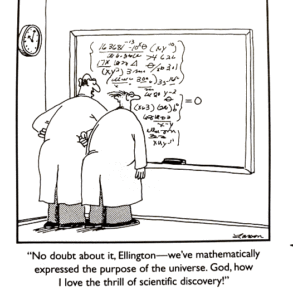 Rather than being opposed to one another as many assume today based on humanist propaganda, science and Christianity — at least in science’s formative years during the 16th century — are conceptually inseparable. The philosophical foundation of modern science is this assumption: “God is a God of reason, therefore His creation can be understood through reason.” The Scientific Method arising from this seminal concept has been the impetus behind every technological discovery in every area of scientific endeavor for centuries and remains so to this day, even absent its overtly Christian underpinnings during modern times.
Rather than being opposed to one another as many assume today based on humanist propaganda, science and Christianity — at least in science’s formative years during the 16th century — are conceptually inseparable. The philosophical foundation of modern science is this assumption: “God is a God of reason, therefore His creation can be understood through reason.” The Scientific Method arising from this seminal concept has been the impetus behind every technological discovery in every area of scientific endeavor for centuries and remains so to this day, even absent its overtly Christian underpinnings during modern times.While other world philosophies and religions — Greco-Roman, Islam, Buddhism, Hinduism, and the other major oriental religious movements — emphasize mystery and intuition, only Judaism and Christianity have coupled reason and logic with faith as their guides to religious truth. As a result, when 16th-century Europeans first started interacting with cultures founded on other religions, European technology was light-years more advanced than anything else they encountered. Oriental and Middle Eastern countries have recently begun to successfully compete with the West regarding science and technology lately, but they are standing on the shoulders of Judeo-Christian scientists and engineers who paved the pay for them.
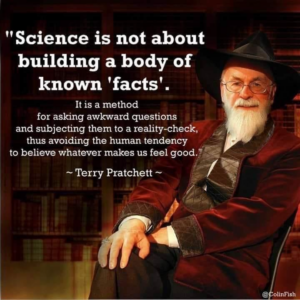 All the following major technologies currently in use were discovered and standardized in the West just to name a few which immediately come to mind:
All the following major technologies currently in use were discovered and standardized in the West just to name a few which immediately come to mind: - Telegraph
- Radio
- Television
- Motion pictures
- Telephones
- Cell phones
- Computers
- Computer operating systems
- Vacuum tubes
- Batteries
- Light bulbs
- Electric motors
- Electric generators
- Cathode Ray Tubes (CRTs)
- Transistors
- Integrated circuits
- Microprocessors
- Light Emitting Diodes (LEDs)
- Optics
- Lasers
- Airplanes
- Helicopters
- Internal combustion engines
- Jet/turbine engines
- Aerodynamics
- Rocketry
- Spaceflight
- Steel ships
- All aspects of modern medicine including germ theory, antiseptic procedures, antibiotics, organ transplants, X-Ray machines, and a host of others
- And the hits just keep on coming!
For this same reason, Western Civilization, itself founded upon the Judeo-Christian worldview, has proven itself superior to all other competing philosophies on the planet. Far more importantly, Western Civilization is the only place where personal freedom and human rights have been obtained, championed, enshrined, and maintained within its member nations, and where chattel slavery has been abolished once and for all.1
-
Tolerance is good, but Truth is absolute.
Since God is the only God and Creator of the universe, He is the only Being within it qualified to instruct us on how it works, whether that be the laws of nature or how successful interpersonal relationships should function. Accordingly, His revealed will on any given topic is the only one which matters in the grand scheme of things. Since He and His Word are immutable (unchanging), whenever He addresses any given issue, we have only two available responses:
- Listen, trust, and obey, or;
- Ignore, refuse to accept, and rebel.
True tolerance is an expression of the love Jesus enjoined us to demonstrate towards one another. Such tolerance recognizes none of us is perfect, we are all works in progress, therefore none of us is qualified to judge others as “less than.” This is accompanied by the salient truth we are doing somewhat better than others solely by the grace of God, rather than through our own best efforts.
However, such tolerance does not include approval of evil deeds committed by those we are “tolerating.” Sin is sin, evil is evil, period. No one gets a free pass, Christian or non-. There are consequences to our sins both here on this earth and in eternity — shielding others from those consequences only enables them to continue unhindered.
Now, I think you will see why the current postmodern world system so resoundingly hates us and everything we believe and stand for as Christ-followers. That being said, I feel the real danger to us as believers is not their overt opposition, but the covert infiltration of their beliefs into the Church, hence this article. Similar concerns are echoed by the NT writers.
Secular Humanism & the Value of Human Life
As I’ve stated in a previous article, all religions and philosophies apart from Christianity reduce the value of human life to zero. This is especially true with secular humanism.
Why is this? The answer is really quite simple, actually: once you remove divine absolutes from the equation, whatever any given human being wants is “right.” and morality completely loses all meaning and significance. This means “right” and “wrong” are immediately supplanted by “whatever I want or is best for me in my own opinion or whatever is best for a group who I either like or thinks like me.”
Once you are on that foundation of sand, anything goes! You can justify all sorts of atrocities when your corrupt opinion of what is “best” is driving your decision-making processes.
This is why Darwin’s theory of evolution is so pernicious. Before he came along, secular humanists were constantly yet futilely attempting to remove God from the core philosophical questions of “How and why do we exist?”, “What determines human morality?”, and “How do we know what we know?” Once Darwin presented his questionable assumptions in On The Origins Of Species and The Descent of Man, and Selection in Relation to Sex, atheist philosophers such as Bertrand Russell, Friedrich Nietzsche, Karl Marx, Sigmund Freud, and a host of others thereafter had a God-free conceptual foundation for existence and epistemology upon which they could build their equally God-free philosophical edifices concerning morality and knowledge.
Absent God having placed His imago upon mankind as His supreme creative act, we are simply reduced to yet another species vying for space on this planet, bereft of any destiny other than to claw our way to the top of whatever hierarchy exists to ensure personal and familial survival. It is a variant of this underlying philosophy — social Darwinism, as expressed by Karl Marx in The Communist Manifesto and Das Kapital — which has fueled every socialist movement throughout history until the present day.
Secular Humanism in Pop Culture
 We see the outworkings of all this in the propaganda coming out of Hollywood and the media. TV series and movies these days are rarely without normalization of illicit sexual behavior and/or homosexual characters and/or transsexual characters, as well as attempting to destroy any other limit on morality espoused by Christianity.
We see the outworkings of all this in the propaganda coming out of Hollywood and the media. TV series and movies these days are rarely without normalization of illicit sexual behavior and/or homosexual characters and/or transsexual characters, as well as attempting to destroy any other limit on morality espoused by Christianity.
Obscene language is pervasive — I recently tried viewing several different Amazon Prime series which initially looked interesting to me and was immediately bombarded by F-word after F-word. It so grieved my spirit, I had to abort them all before completing even 5 minutes of each series’ first episode. That doesn’t mean I won’t watch a show or movie with such language in it — it means these shows were so gratuitous in their use of obscenities that it simply became tedious and spiritually annoying to watch. The other streaming services are little better, if at all.
Same thing goes with other series and their constant portrayal of homosexuality as being a good, normal, and healthy lifestyle, including love scenes. ABC’s Grey’s Anatomy and Modern Family are examples of the so-called “entertainment” industry constantly propagandizing all this, but these are by no means the only ones. My wife and I recently viewed a couple of episodes of an Amazon Prime series on the role of dance in various countries. In each episode, they just had to include and celebrate either blatant public nudity or homosexuality and transgenderism. Again, spiritually grievous. The most egregious example of this kind of perversion-normalizing was the child-pornography series “Cuties” on Netflix.
Secular Humanism in Government
All this same corrupt baggage carries over intact into the political sphere. Our Founding Fathers recognized the inherent selfishness of mankind and several have noted in their writings the only way the United States could conceptually exist — and survive in the long term — was through a populace who collectively would adhere — philosophically and behaviorally — to a Judeo-Christian worldview, mores, and ethics.
In an effort to ensure the survival of our republic, they created this marvelous document called the U.S. Constitution which exists for the sole purpose of enumerating and limiting the powers of government — not the powers of US citizens. Their stated intent was to hinder corruption, malfeasance, and tyranny by our government and its officials, thereby preserving individual liberty. Unfortunately, over time and as our country has strayed from its Judeo-Christian moral foundation, even the laws of this nation and the judiciary which enforces them have in many cases become corrupted.
As we have already established, no human institution is immune to corruption over time, therefore every political party is corrupt to some degree or another, regardless of that entity’s political persuasion or how well they may have started. As I stated earlier, because each and every political candidate arising to lead those parties is also a human being with a flawed and sinful nature, every vote we cast will always be for the perceived lesser of the available evils.
But there is one group of parties which have totally embraced secular humanism as their core philosophy and are therefore ones which should be assiduously avoided by all Christian believers. Each of these parties presents a real and existential threat to our individual liberties, especially our freedom to worship and follow Jesus without let or hindrance. All these parties are determined to suppress all forms of religious thought even remotely resembling Christianity. They are: the Communist Party, the Socialist and Democratic Socialist Parties (which includes Nazism), and the modern-day Democratic Party. Even a cursory open-minded examination of their party platforms firmly establishes their credentials as anti-Christian in every possible way.
I can hear some of you responding to my last paragraph with, “What? You mean I have to be a Republican to be a Christian!?”
Nope, never said that!
If you find the Republican Party detestable, I have no problem with that at all — indeed there is much to detest. The entrenched Republican establishment is indeed corrupt and worthy of both our contempt and condemnation.
What I am saying is this: aligning ourselves with any political party having a platform founded upon the idolatry of secular humanism, and/or voting for its candidates is totally inconsistent with our Christian profession.
Followed by my admonition stated above: we are always voting for the least of the available evils.
Thanks for reading!
Footnotes
- The Victory of Reason: How Christianity Led to Freedom, Capitalism and Western Success by Rodney Stark © 2005

